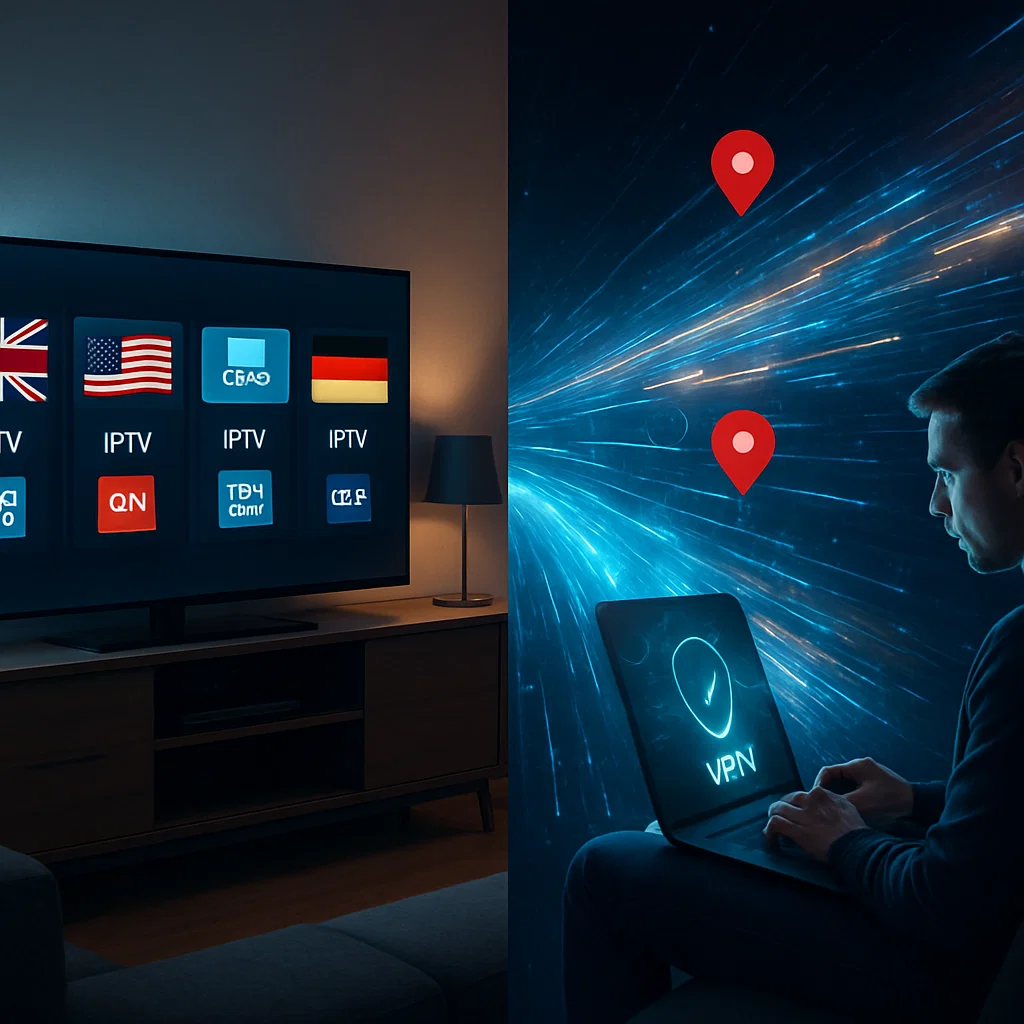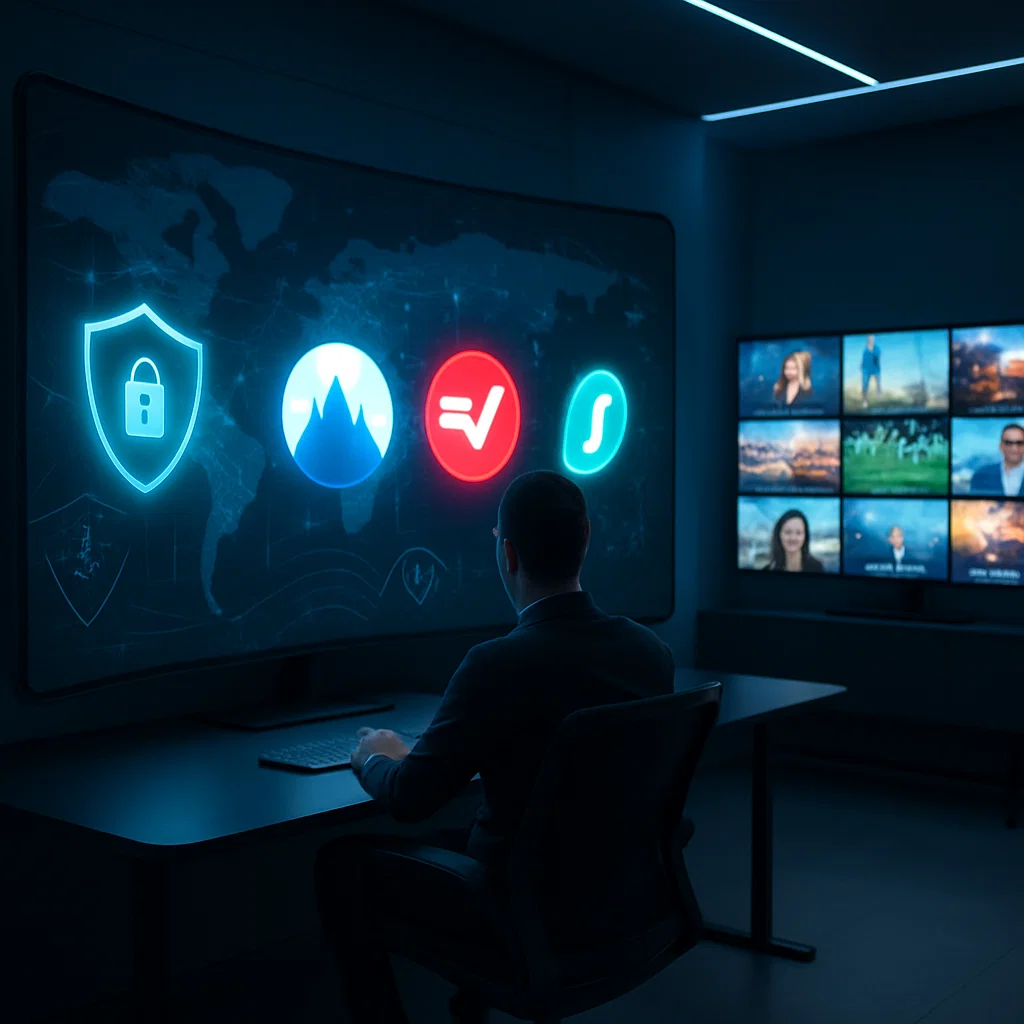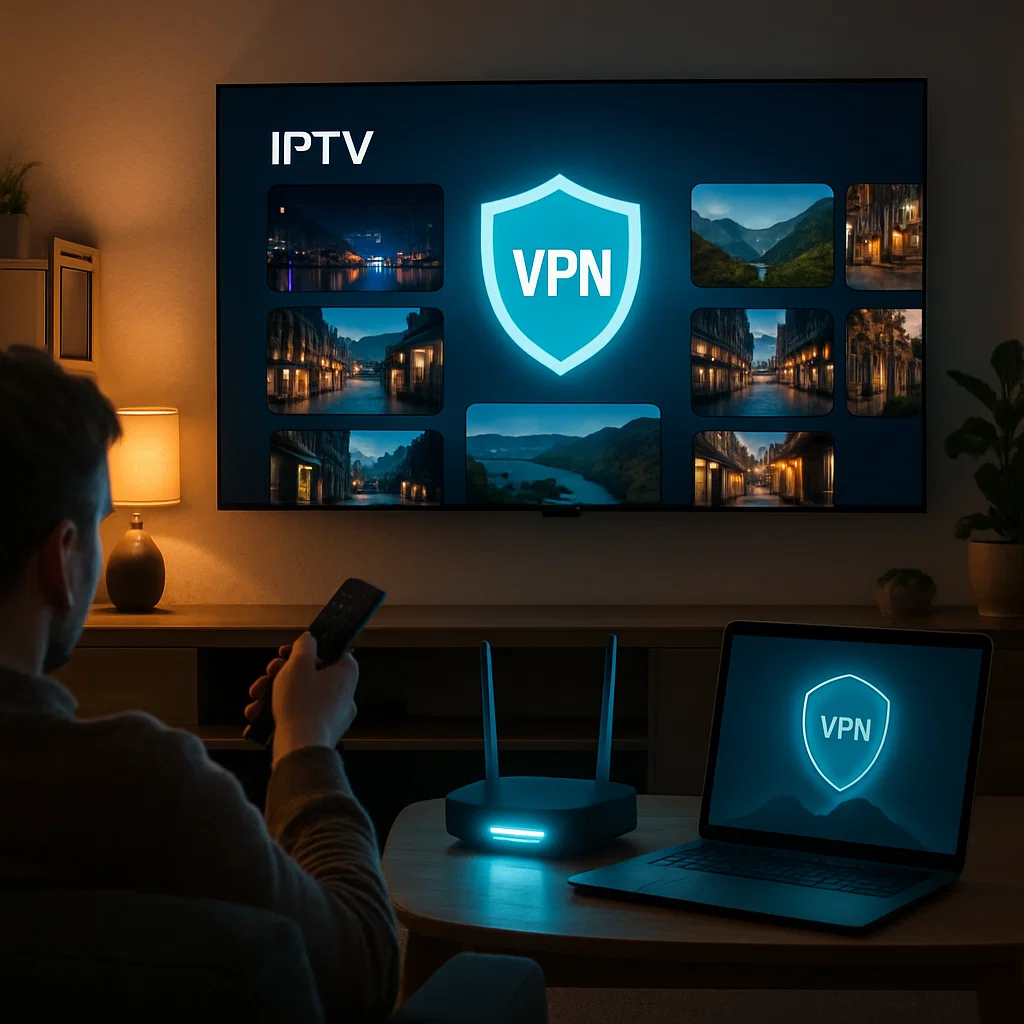What is an VPN for IPTV?
An IPTV VPN is a virtual private network designed to protect you while viewing TV Streaming. IPTV is a generic term for any type of TV viewed over the internet. Initially, the Streaming acronym was used to denote standard television broadcasts streamed over the internet.
An example would be a live TV news broadcast viewed on any device via online data. In time, the definition has broadened to encompass TV-related media, such as streaming media. For the sake of this article, we’ll be working with the old school definition of Streaming — TV programming sent over the internet, as opposed to satellite or cable.
We won’t be covering such streaming devices as Amazon Firestick or Netflix. This can be a YouTube TV news channel, a live show broadcast to your television receiver over Wi-Fi, or any other TV material broadcast through an internet link. A Virtual Private Network is an internet security device that encodes information as it moves from your device or network and onto the larger internet.
VPNs are used to protect your privacy, avoid hackers, and even increase bandwidth speed. Naturally, an IPTV VPN is simply a Virtual Private Network designed to secure streaming users.
Why Use a VPN for IPTV?
VPNs will conceal your IP address and shield your internet identity from hackers, operators, your ISP, and other malicious actors. This is crucial for Tv channels Service.
Since streaming owners/operators are mostly unknown or “unofficial”, we can’t be sure what they are doing with our data, and that can be frightening if you don’t secure yourself.
There are thousands of Tv channels services, live TV apps, Kodi add-ons, and streaming websites that show live channels. So why would one use a Virtual Private Network for TV Streaming services and applications? Read our reasons below.
Protect Yourself from Bad Actors
It’s important to note that some IPTV services/apps are verified and others are not.
If a tv channels service/app is available on a trusted app store like Amazon or Google Play, we can be sure it’s legal.
On the other hand, unverified Streaming services are operated by third parties, and it’s impossible to determine if they have the proper licenses for the content they offer.
It’s essential to take all possible security precautions, as we’ve recently discovered that these unofficial platforms are unreliable.
Some unverified streaming service operators have even been linked to organized crime, including cyber fraud, arms trafficking, drug trafficking, and human trafficking.
The main disadvantage of using unverified services is legal issues and potential security breaches.
We’ve seen many services shut down or pirated over the years. What happens to your personal data in this case? See the articles below.
Prevent ISP Blocking & Throttling
It’s also important to understand that some internet service providers (ISPs) block TV services, and the only way to access them is through aVirtual Private Network.
This makes sense, since ISPs are also involved in the cable industry, and using television content services is a smaller investment.
A Virtual Private Network encrypts your internet connection, preventing your ISP from monitoring your online content.

How Does an IPTV VPN Work?
A VPN for IPTV works like any other Virtual Private Network: it creates an encrypted tunnel between your device and a provider’s server.
Once you’ve installed the Virtual Private Network app on the device you want to use to watch television content, simply activate the VPN and connect to a server. The client uses a VPN protocol (a set of pre-programmed rules for encryption, decryption, and data transfer) to establish an encrypted tunnel between itself and the server of your choice.
Data entering the tunnel is encrypted and converted into a jumble of random codes. It’s then communicated to the other end of the tunnel, where it’s cracked. The encryption and decryption process is based on keys generated by the VPN protocol.
With a reliable and powerful Virtual Private Network, this process is so fast that you won’t notice any significant drop in your internet speed, allowing you to continue streaming content securely, without buffering or lag.
Risks of Using IPTV Without VPN
While television content offers a convenient way to access live TV channels and video content, using it without a Virtual Private Network carries certain risks. However, it’s important to understand that these risks can be mitigated with a VPN service. A Virtual Private Network, creates a protected, encoded connection between your device and the internet. This safeguards the privacy and obscurity of your online activities.
How to Choose the Best VPN for IPTV
Now that you understand the importance of using a VPN for IPTV, let’s look at how to choose the right IP service for your streaming needs.
When selecting a VPN for IPTV, there are many factors to consider. These will ensure a smooth streaming experience and seamless access to your chosen TV channels.
Factors to Consider
Here are some key factors to consider when choosing a VPN for IPTV:
Server Location: Choose an IP service with servers located in countries where the TV channels you want to access are available. Having servers in these countries will allow you to bypass geo-restrictions and access the content you want.
Connection Speed: Look for an IP service that offers fast and reliable connections for smooth TV streaming. A slow connection can cause buffering and interruptions, which can be frustrating when trying to watch your favorite shows or sporting events.
Encryption Strength: Choose an IP service that uses strong encryption protocols to protect your data and ensure your privacy. With the rise in cyberthreats and hacking attempts, it’s crucial to choose a VPN that prioritizes your online security.
Considering these factors will help you narrow down your options and find the service that fits your specific TV streaming needs.

Best VPNs for IPTV (2025)
NordVPN: The Best VPN for Streaming Service
Surfshark: Best for budget-conscious users
IPVanish: Best for security and privacy
ExpressVPN: Best for users looking for a premium VPN
CyberGhost: Great choice for beginners
PureVPN: Best for users connecting from restricted countries
ProtonVPN: Great choice for privacy-conscious users
PrivateVPN: Great choice for ease of use
How to Install a VPN on IPTV Devices (Firestick, Smart TV, IPTV Boxes)
Firestick
- Open the Amazon App Store on your Firestick.
- First of all search your preferred VPN app (such as NordVPN or Surfshark).
- Install the application and log into with your account login details.
- Connect to a safe server and open your streaming application to start streaming tv channels.
Smart TV
- If your Smart TV supports VPN apps, open the App Store and install the VPN directly.
- Connect to a server.
- If VPN apps aren’t supported, configure the VPN on your Wi-Fi router so that the Smart TV automatically uses the VPN connection.
IPTV Boxes
- Go to the App Store on your device and search for the VPN app.
- If it’s not available, download the VPN APK file and install it.
- Open the VPN app, log in, and connect to a server before using IPTV services.

Free VPN vs Paid VPN for IPTV: Which is Better?
When choosing a VPN service, you will encounter two main options: free and paid streaming VPNs. Each has its own advantages and disadvantages.
Free VPNs: These services do not require payment, but often generate revenue through advertisements or the sale of user data.
Paid VPNs: These services require a subscription fee but invest in robust infrastructure, advanced features, and secure encryption methods to provide excellent security and performance.
It is important to choose the right VPN based on your needs. Factors like security, speed, privacy policies, and customer support are crucial in making this decision. This guide will help you understand the differences between free and paid VPN services so you can make the informed decision that’s best for you.
Conclusion
IPTV offers a great way to watch quality content from a variety of online providers. But maximize out of your subscription, you need a VPN.
The best IPTV VPN can not only unblock geo-restricted content that is not available in your region, but it can also ensure that your ISP does not throttle your connection. After all, some TV channels may not be fully legal, so the last thing you want is for your ISP to spy on your usage and restrain your service.
NordVPN is the best VPN for IPTV in 2025, offering access to thousands of servers worldwide, impenetrable privacy, and industry-leading connection speeds for lag-free video streaming. Try it with the 3-days free trial and 30-day refund guarantee.
FAQs About IPTV & VPN
Does IPTV Have a Built-in VPN?
No, IPTV services do not have a built-in VPN. This means you will need to install a separate VPN service on your IPTV device or home router to enjoy the benefits. My top recommendation is NordVPN, which offers industry-leading performance, thousands of servers, and plenty of apps for popular streaming devices.
Does a VPN Slow Down IPTV?
All VPNs will slow down IPTV streams very slightly, but with a good VPN the impact should be largely imperceptible most of the time. The faster your VPN, the faster your IPTV connection will be.
Which Country is Best for IPTV VPN?
Basically, you should connect to a US server when using a VPN with IPTV. Indeed,The most popular IPTV providers are based in the United States. Fortunately,the best VPNs, like NordVPN and Surfshark, have plenty of US servers to connect to.
Can I Use a Free VPN for IPTV?
Yes, you can use a free VPN for IPTV, but I don’t recommend it because free VPNs are unlikely to work with IPTV. They are subject to bandwidth limitations and cannot offer many servers, resulting in slow speeds, lags, and buffering – an overall unpleasant experience.



Enjoy 30,000+ channels, movies, and series for all age groups with our IPTV service. Embrace the future of television with no more traditional TV hassle! Watch in stunning 4K, FHD, and HD. Try it now at GREEK IPTV.